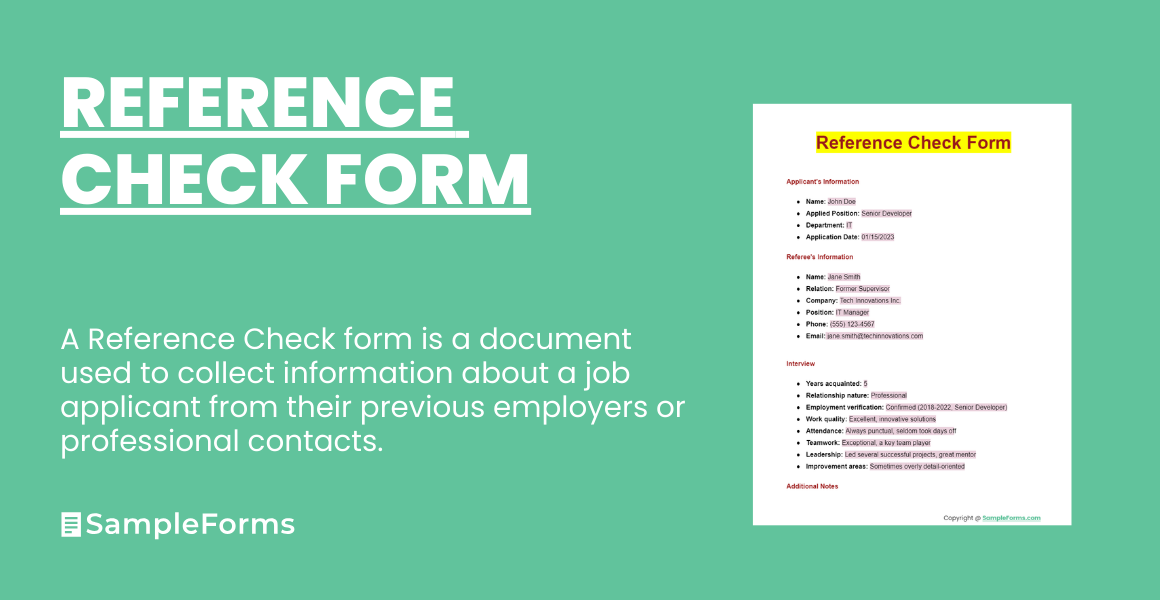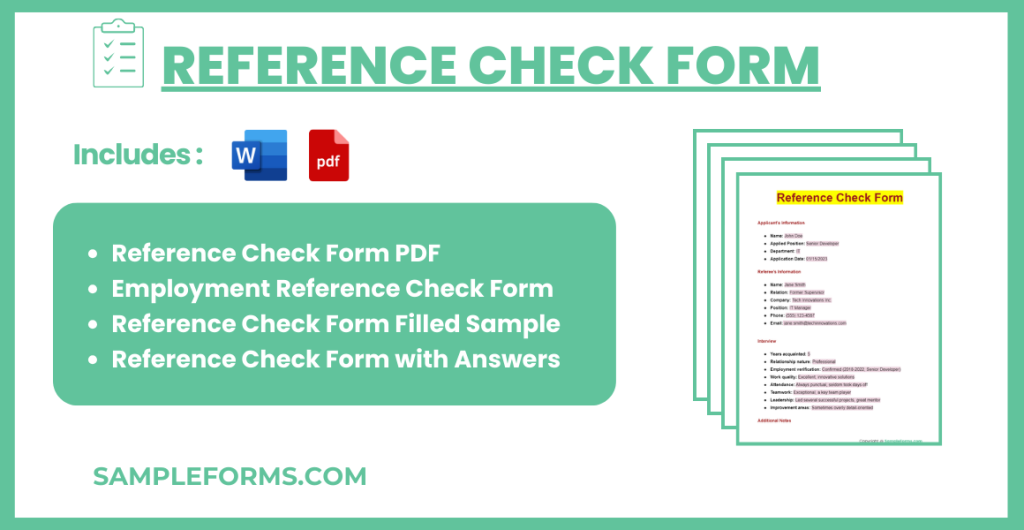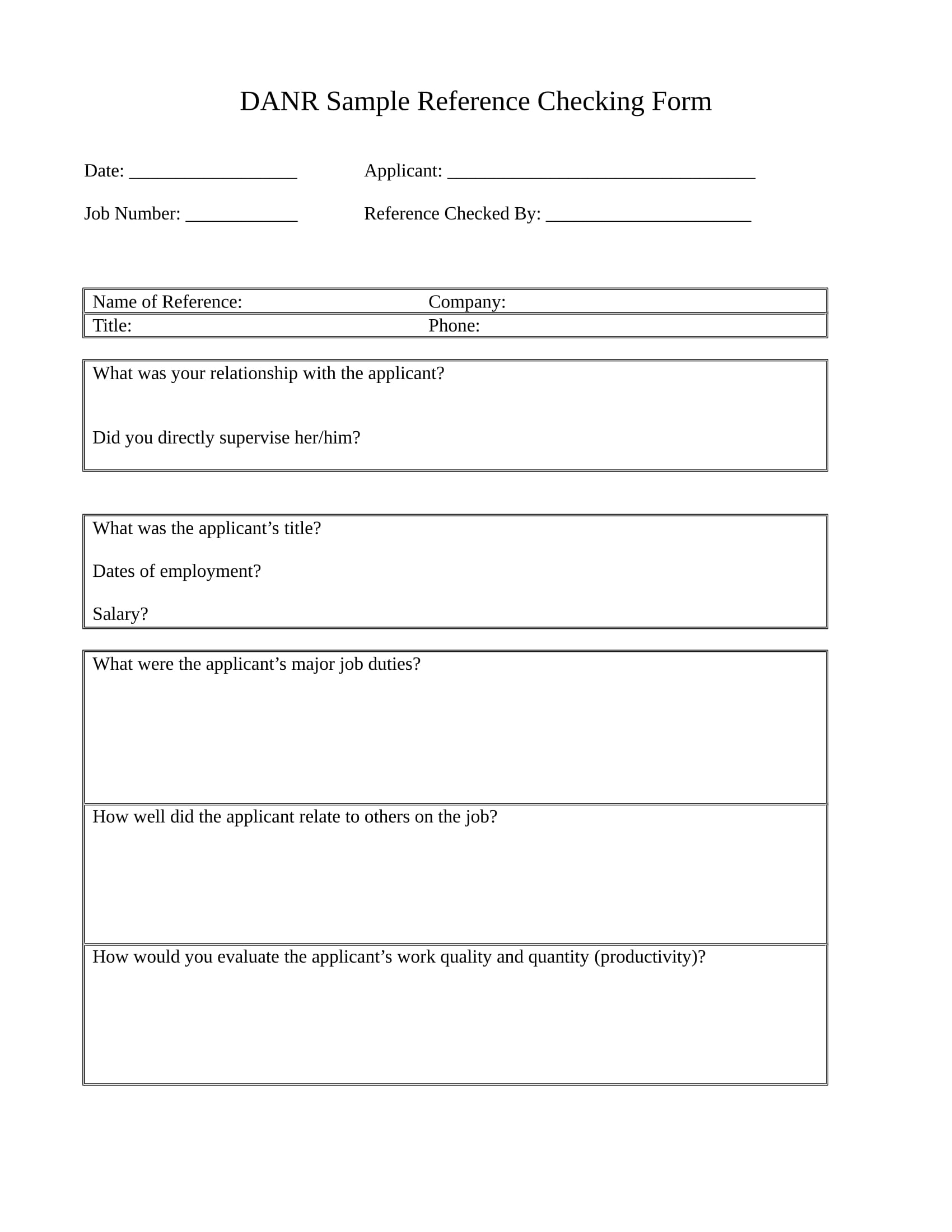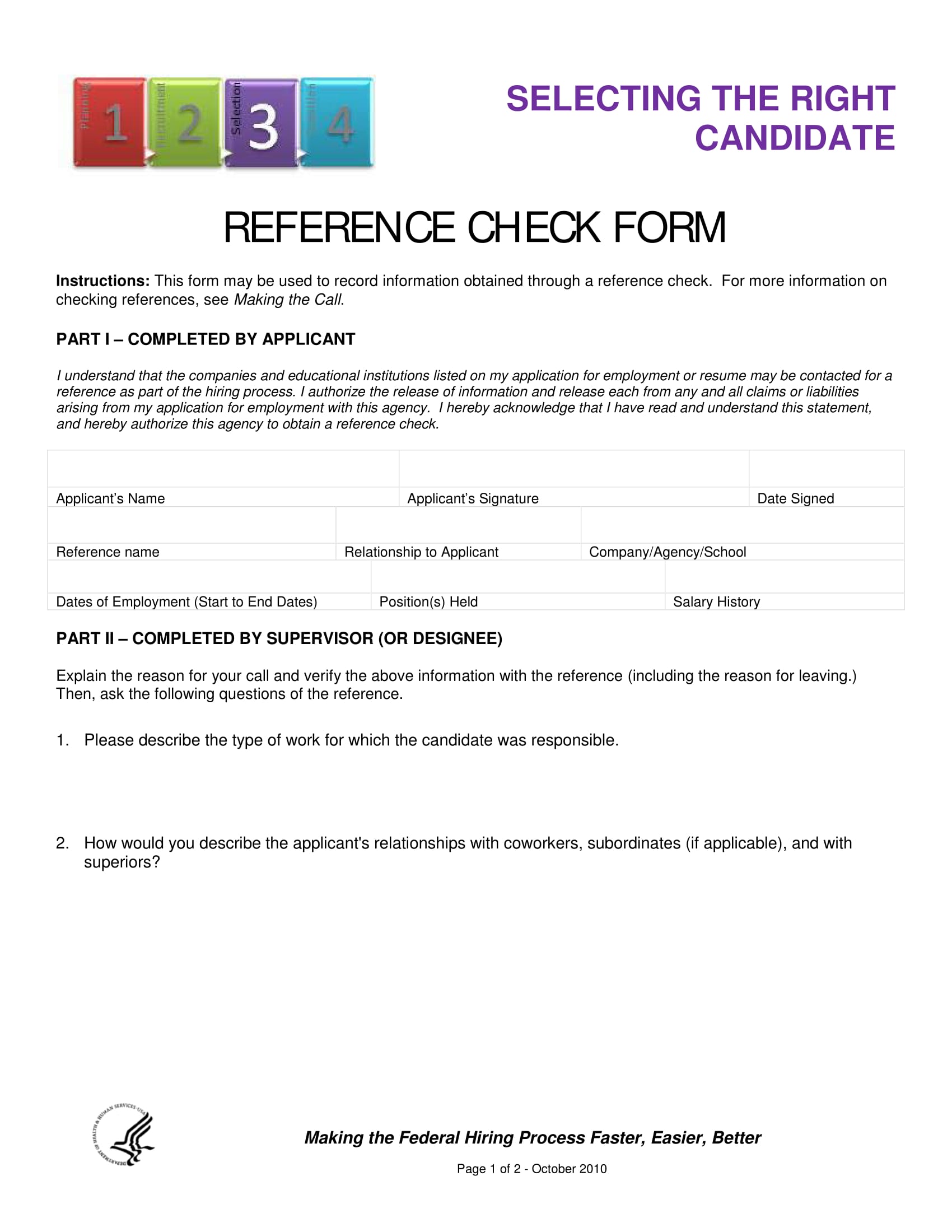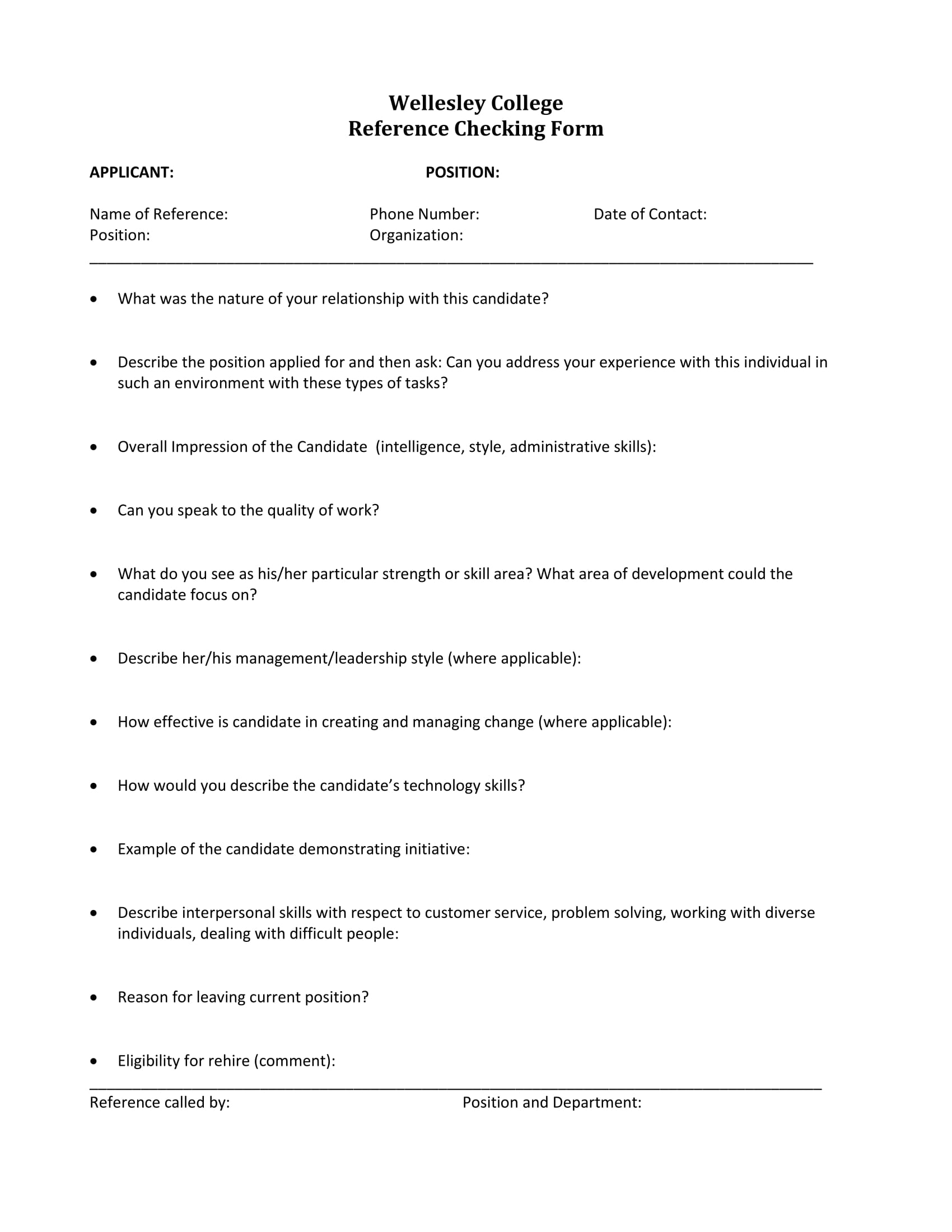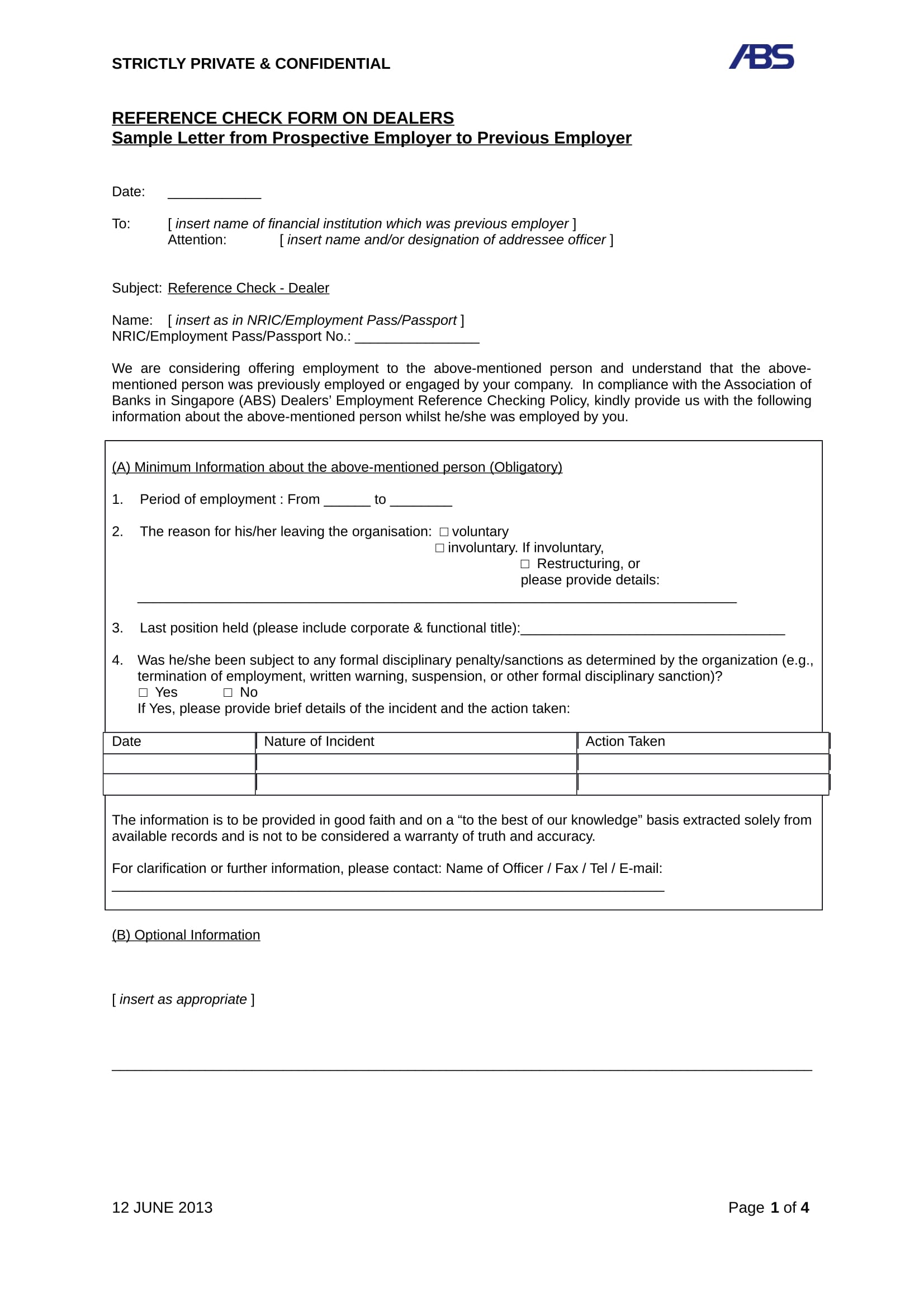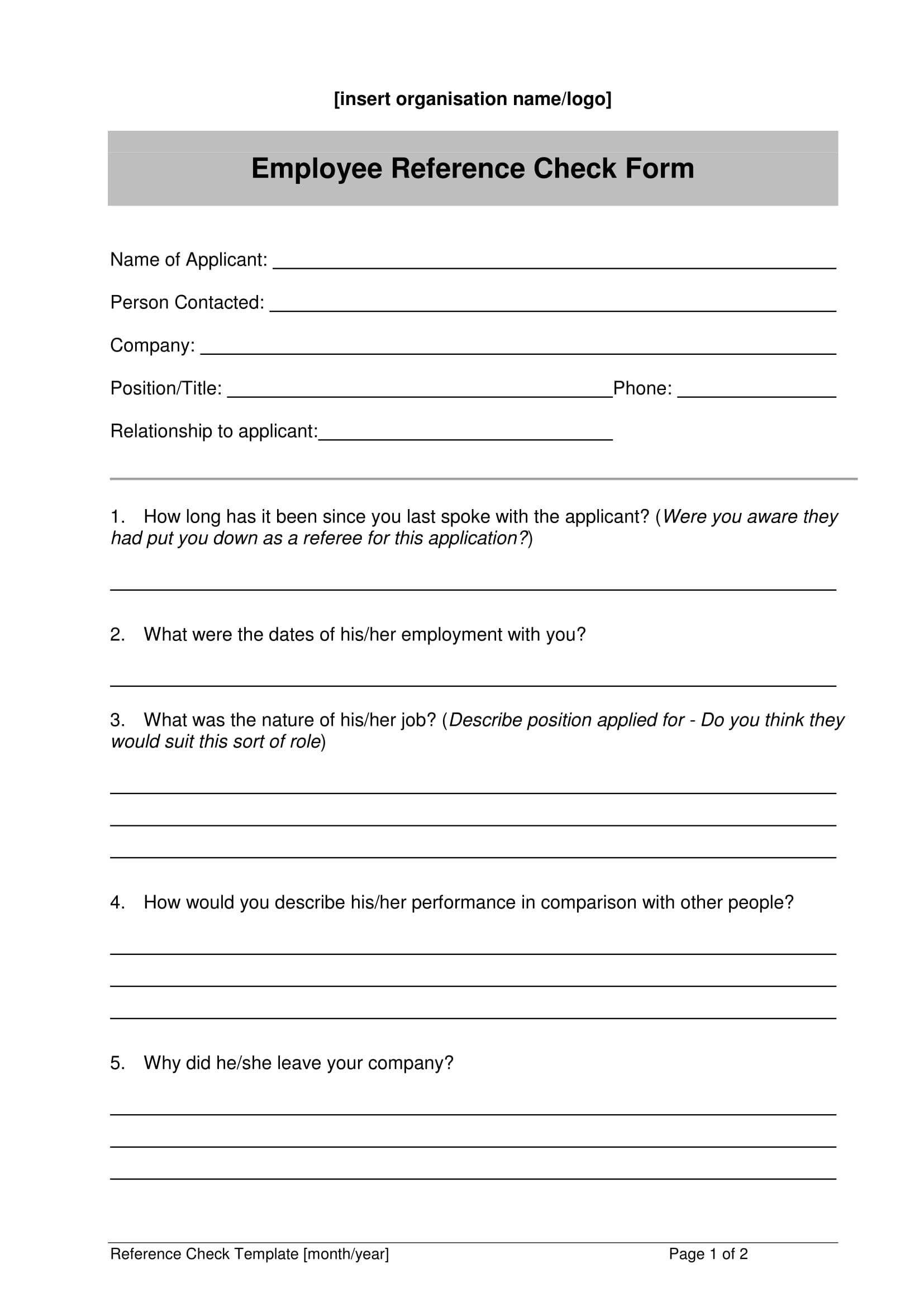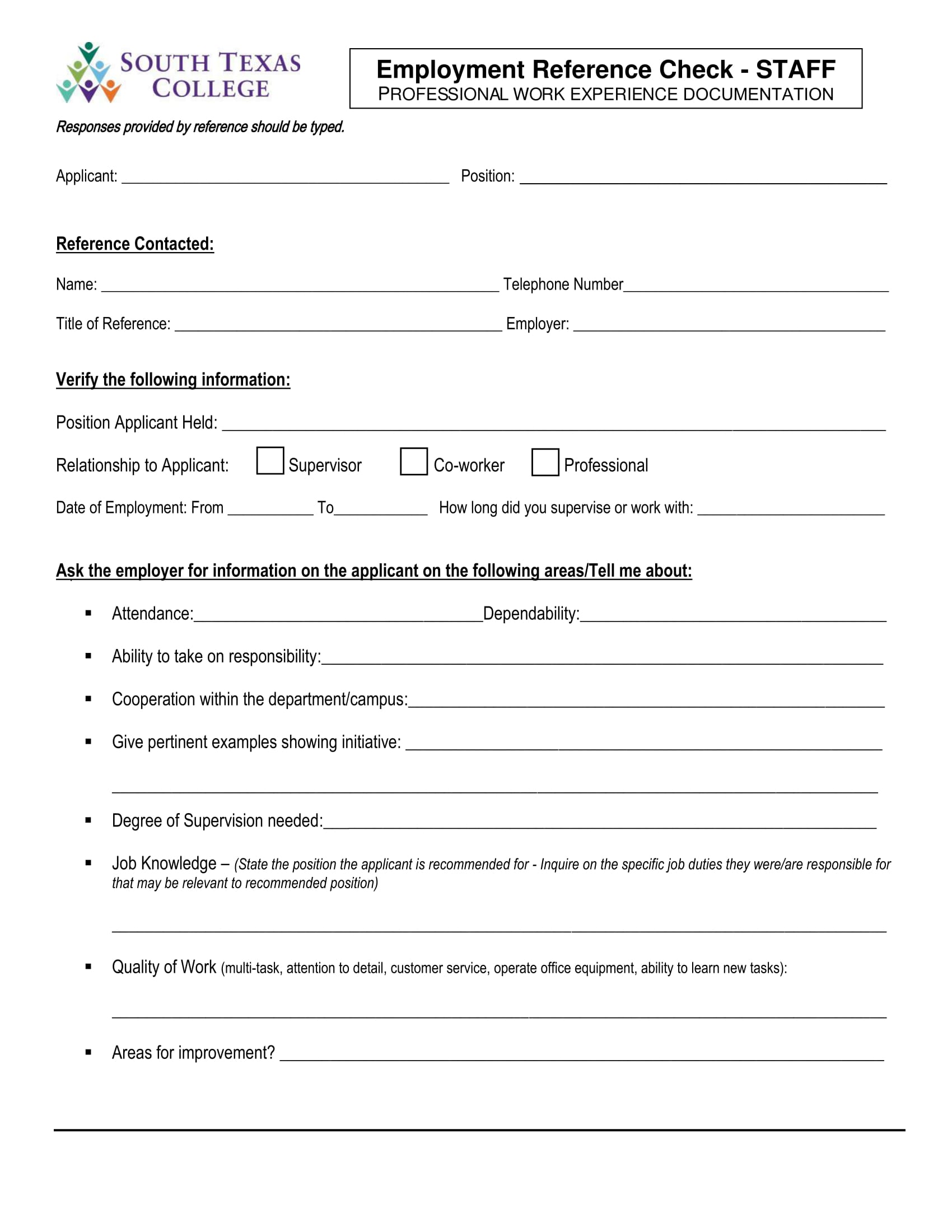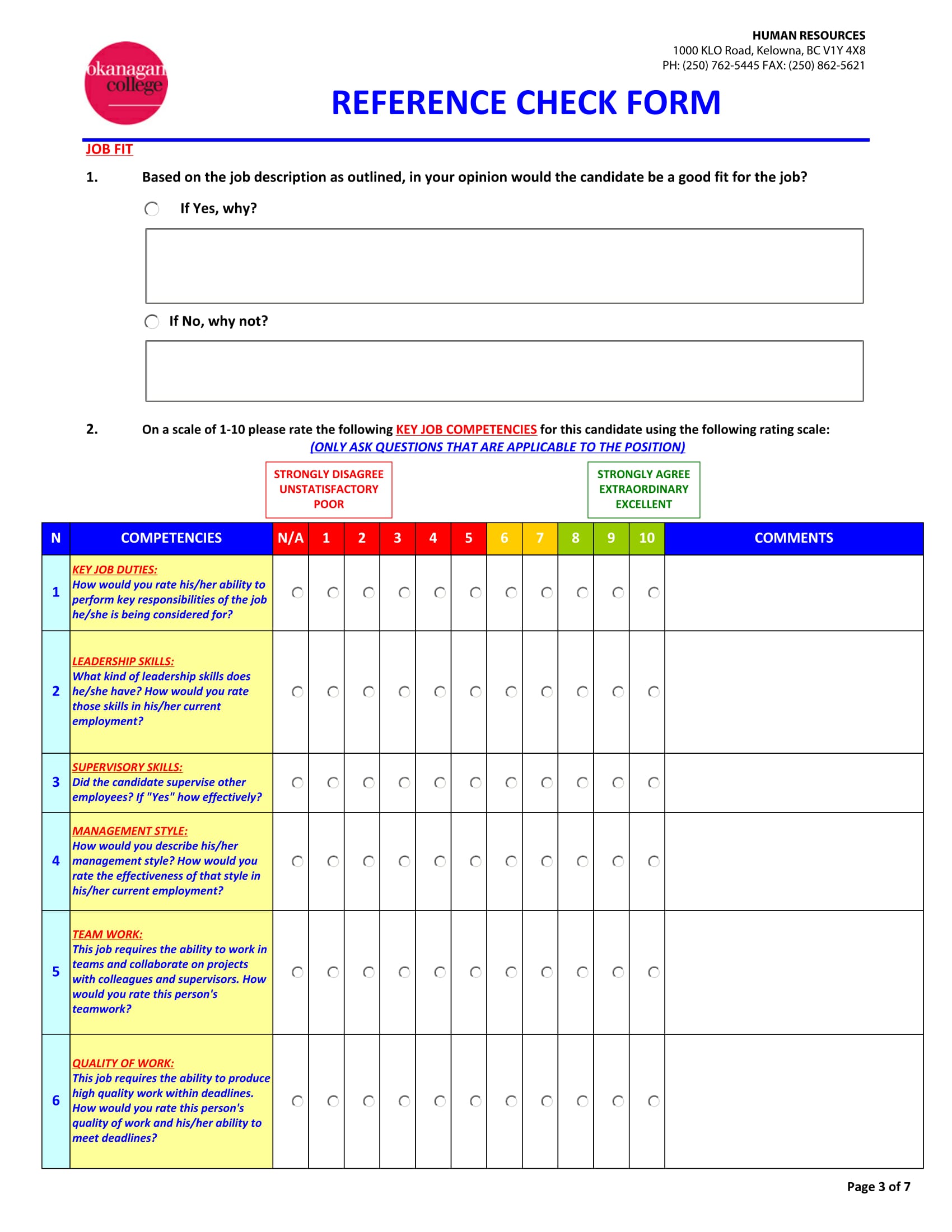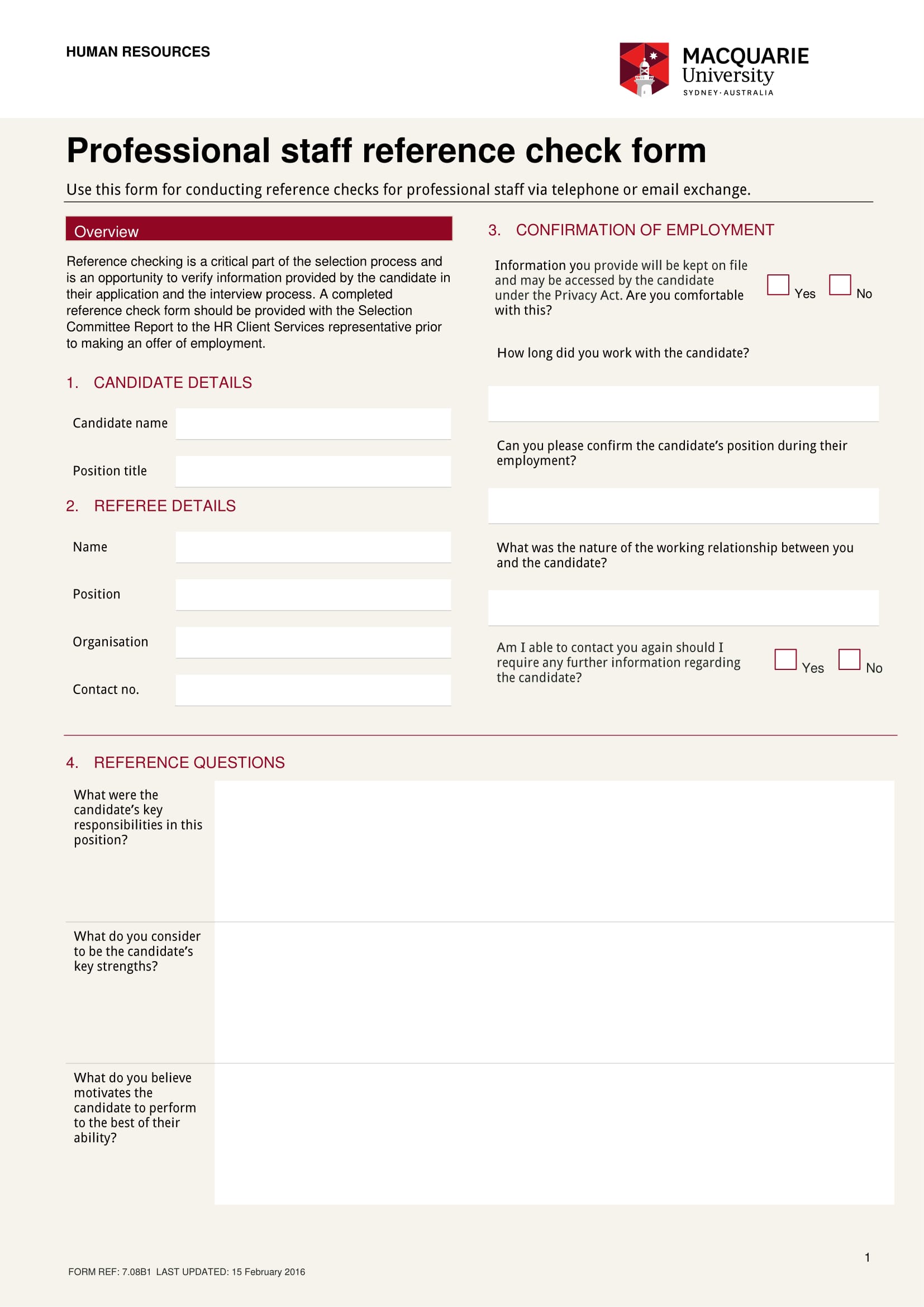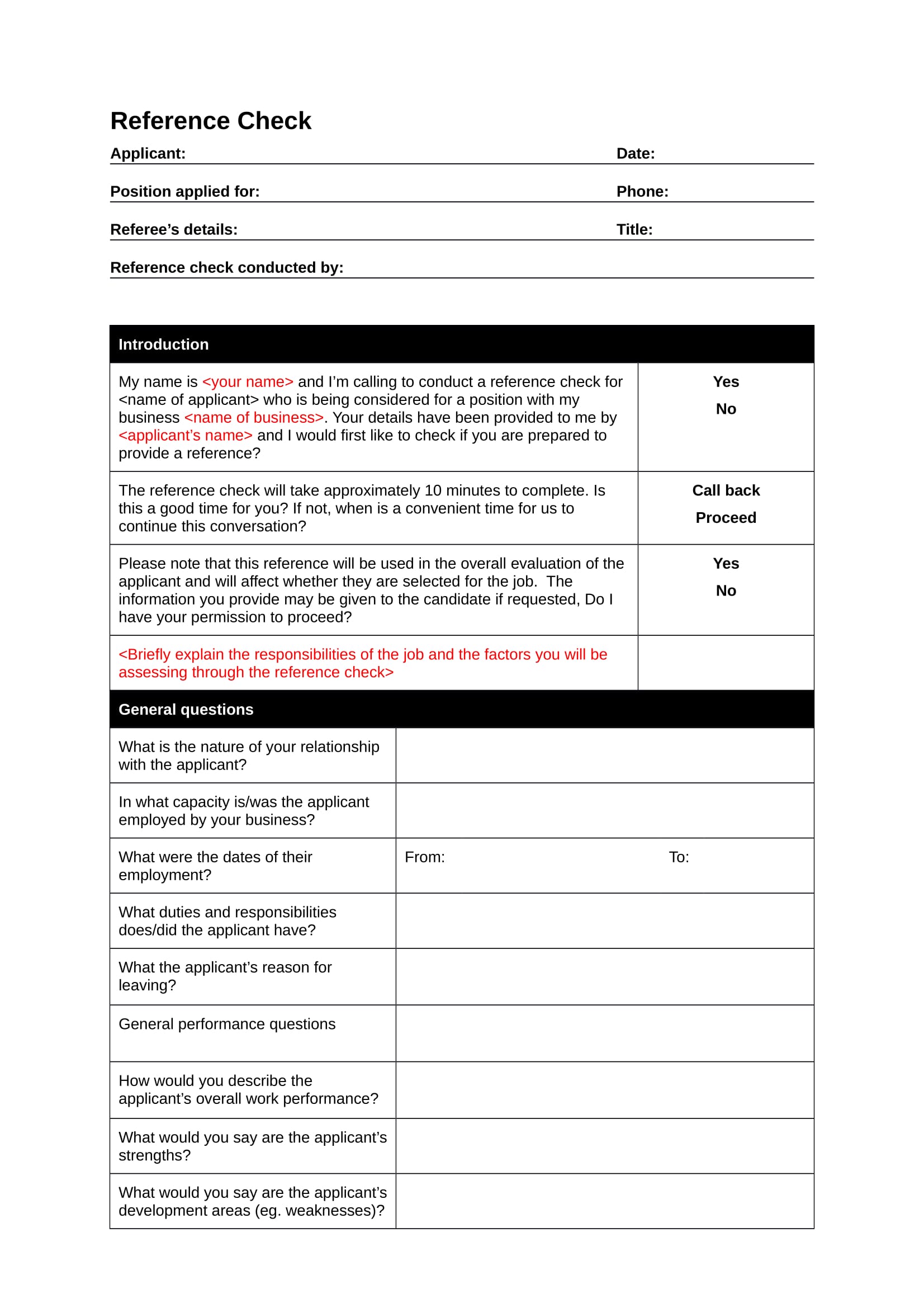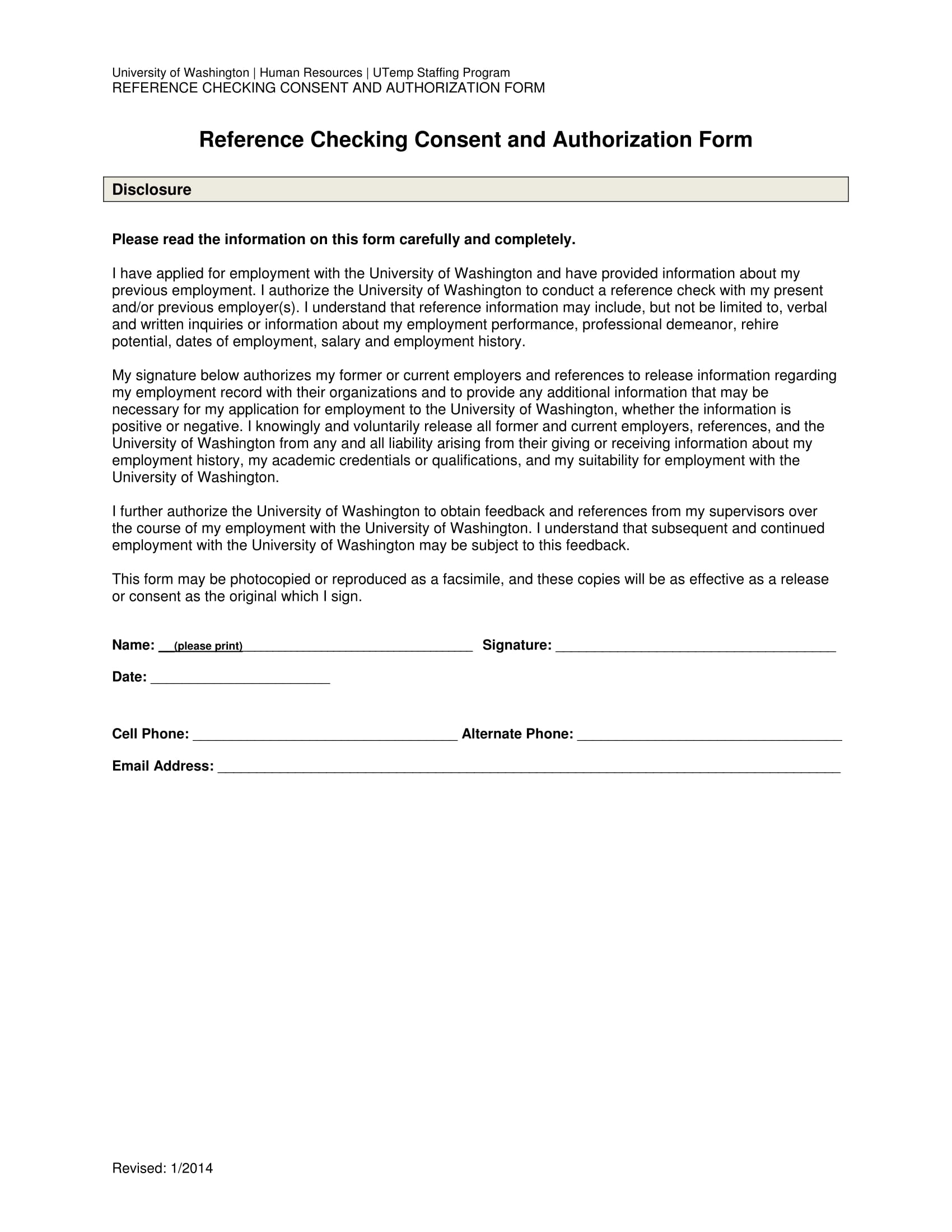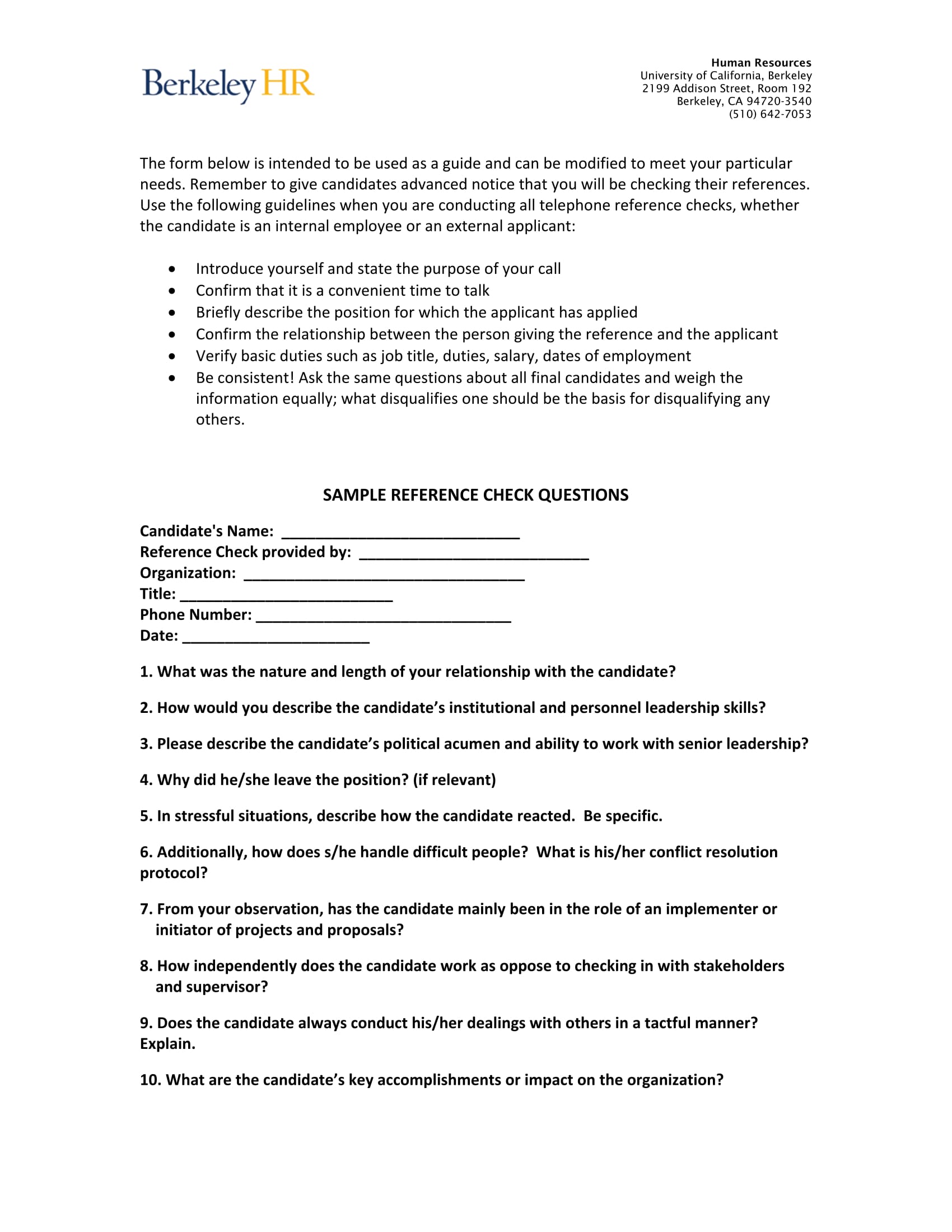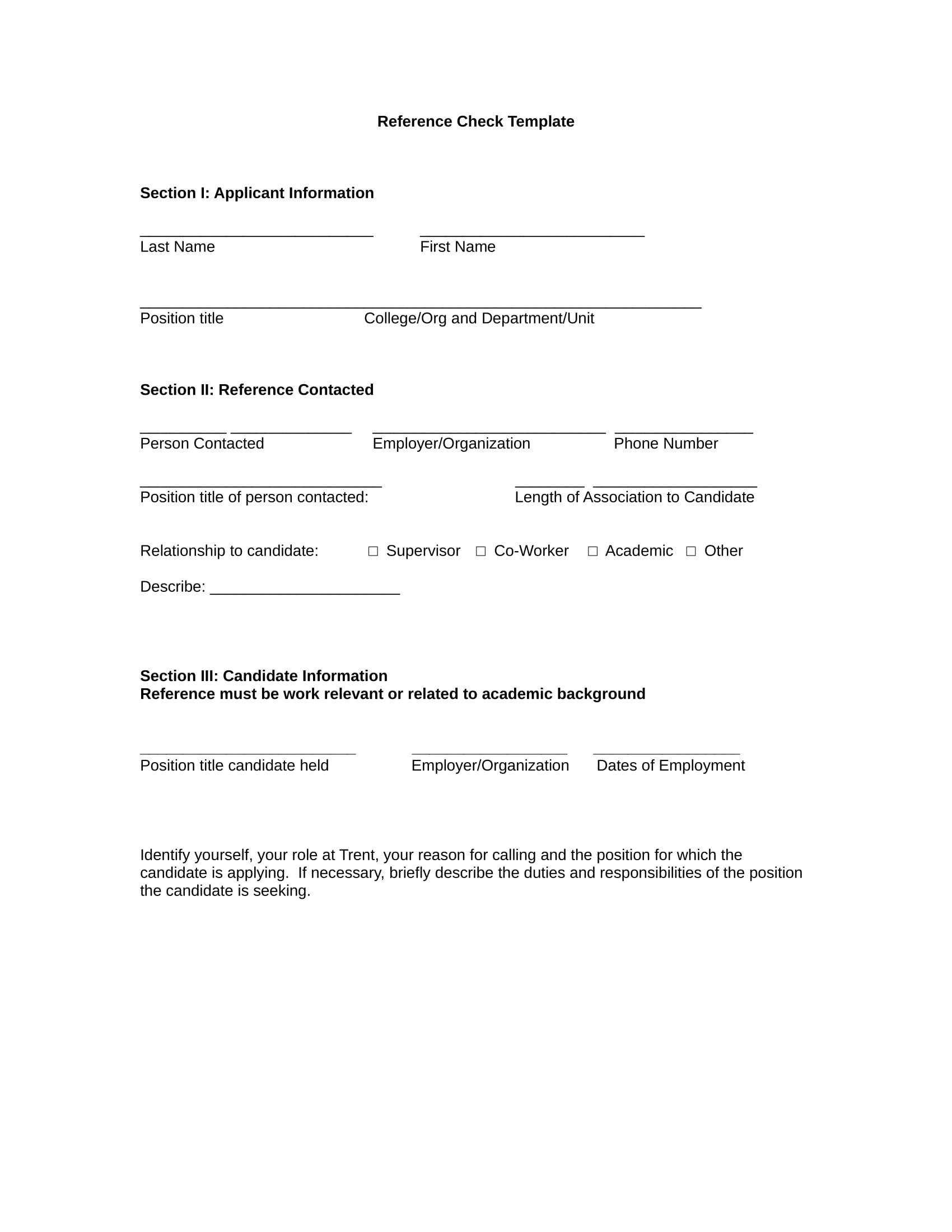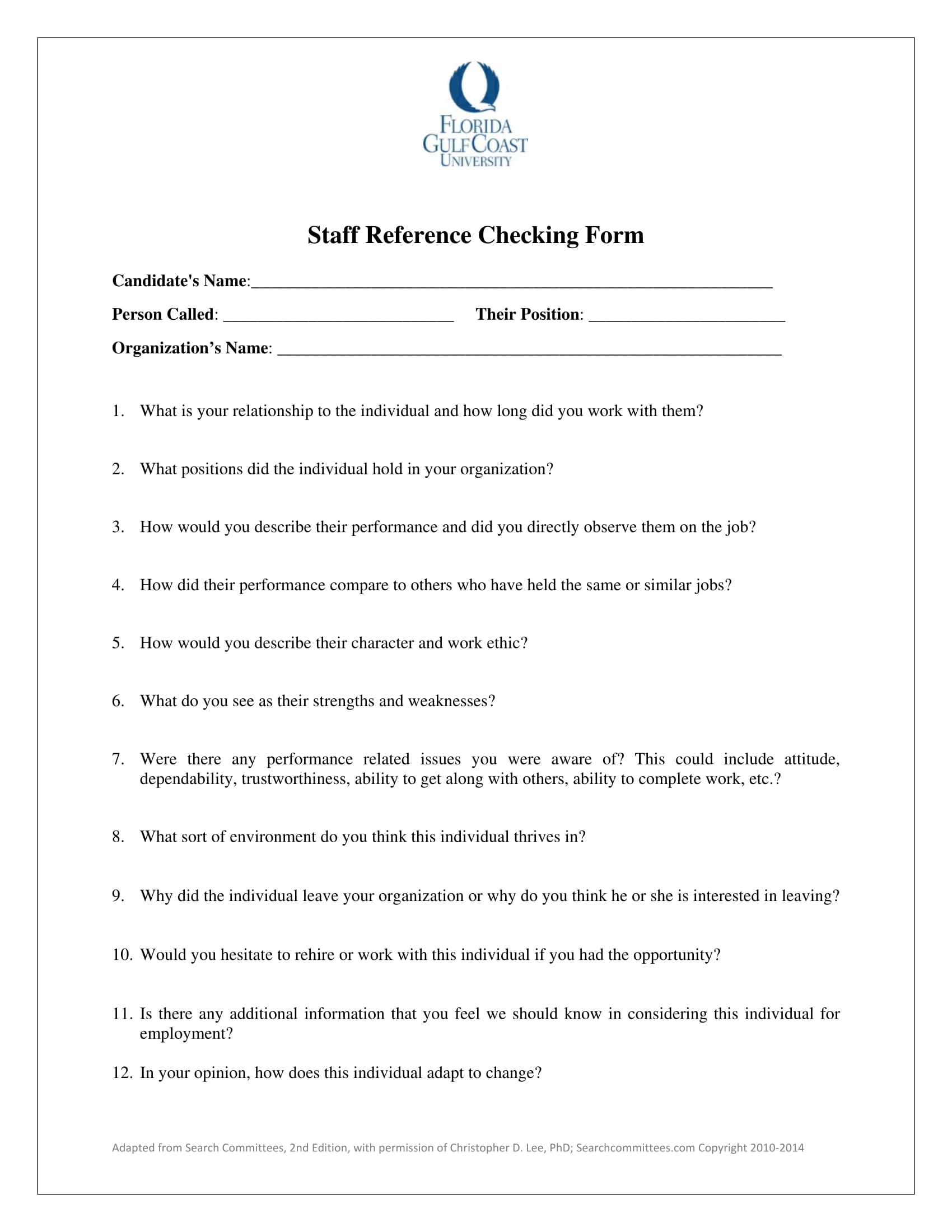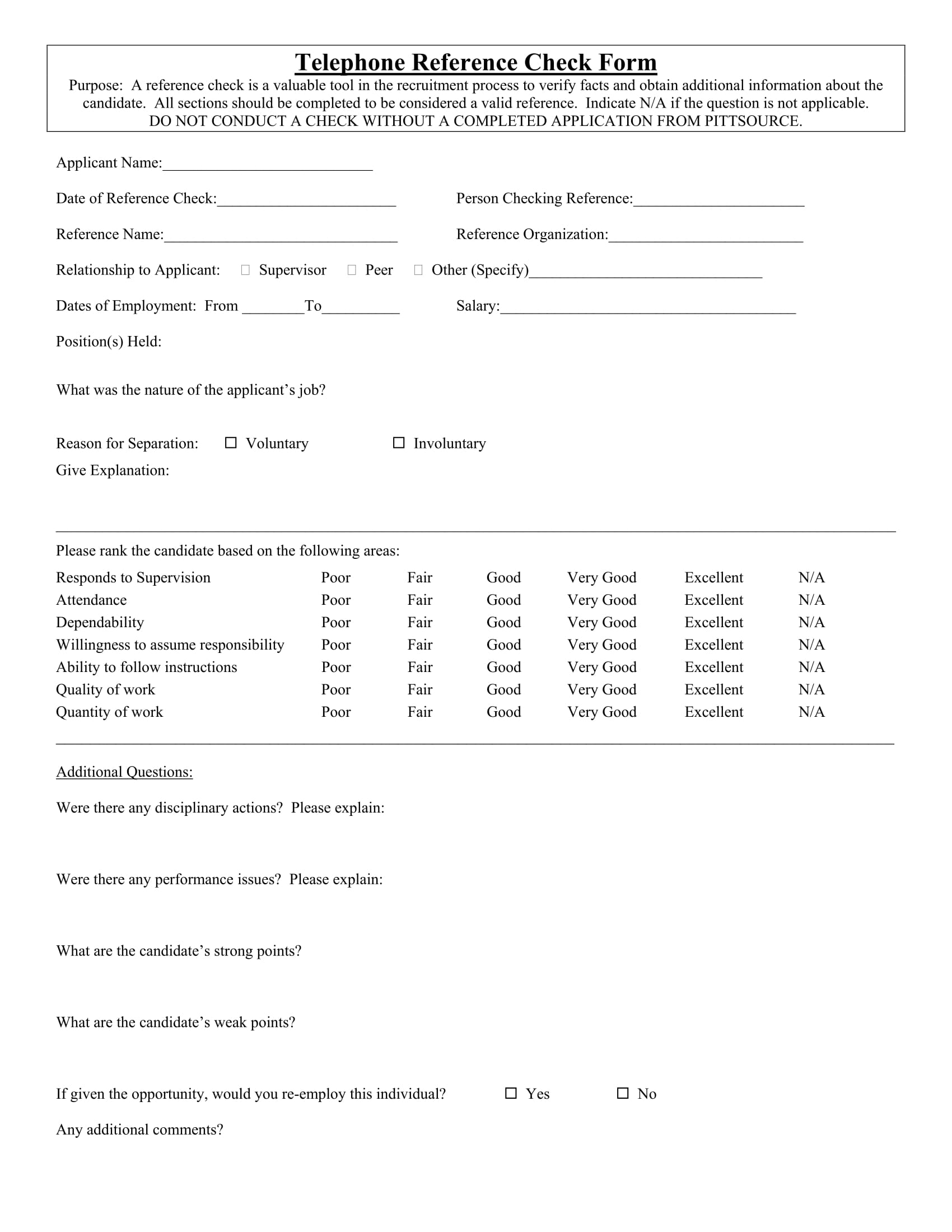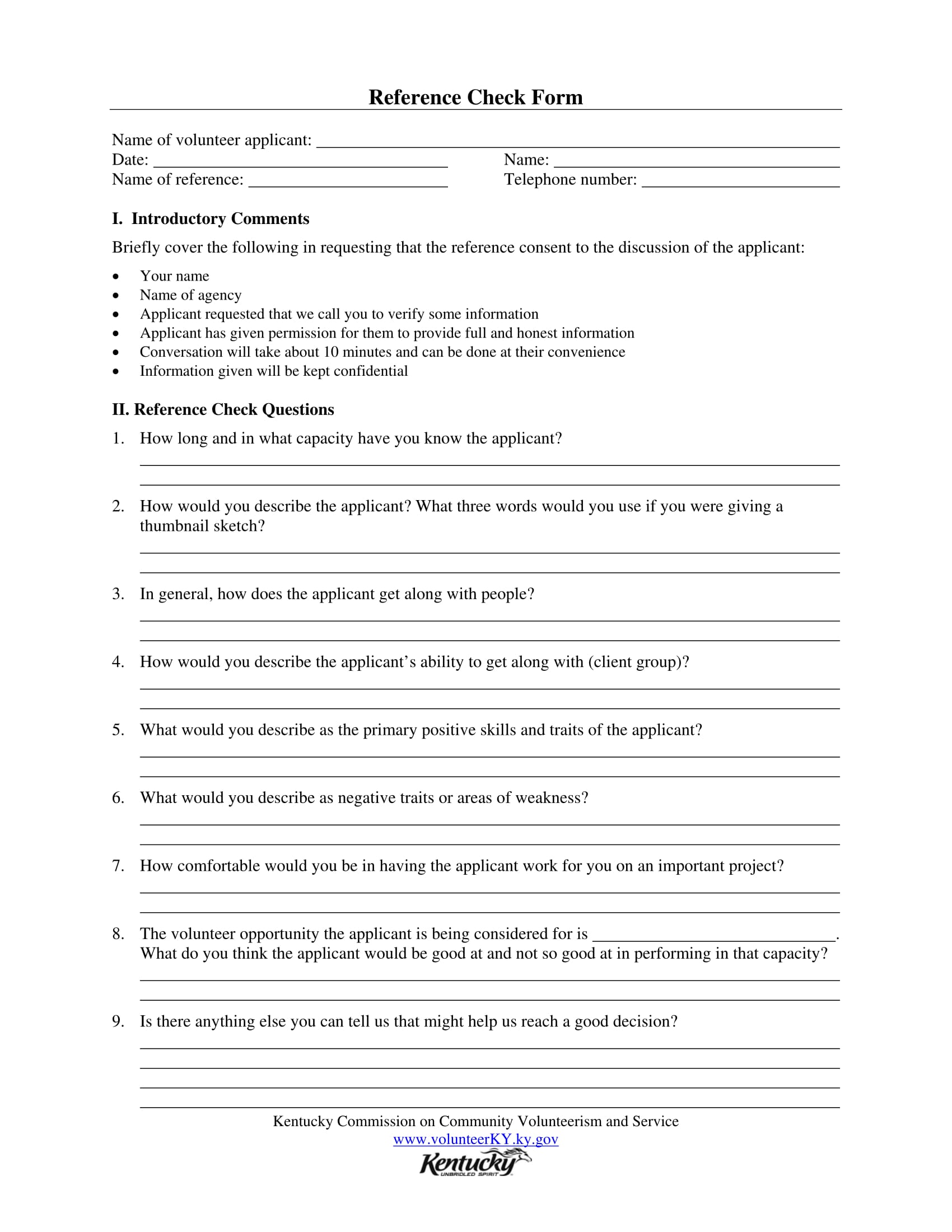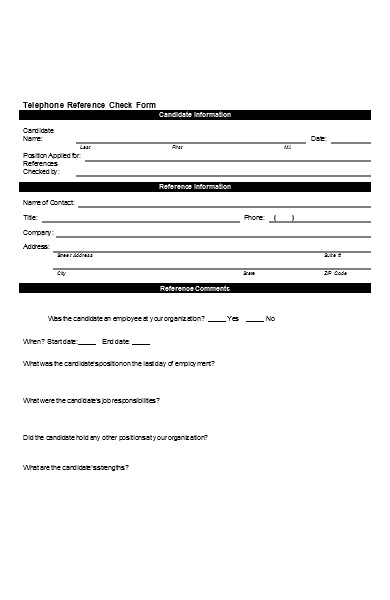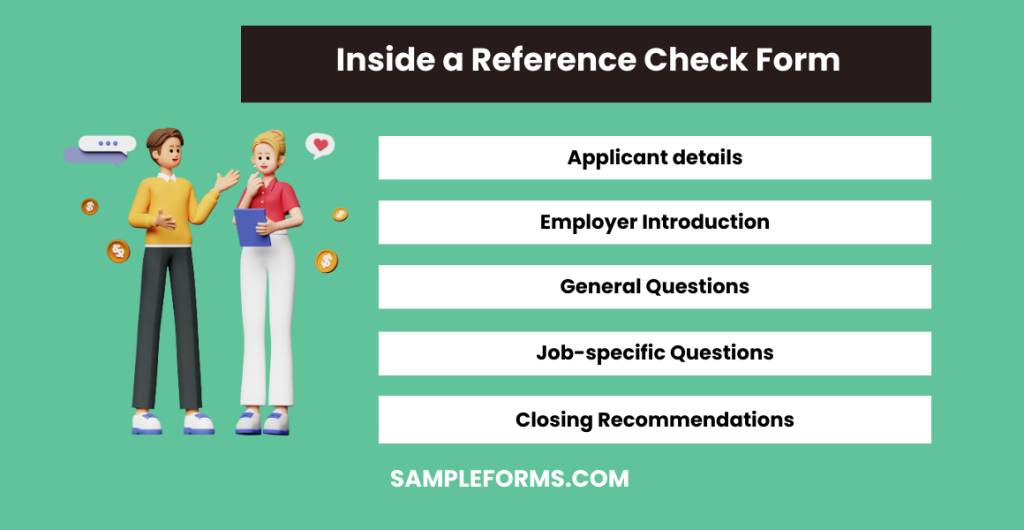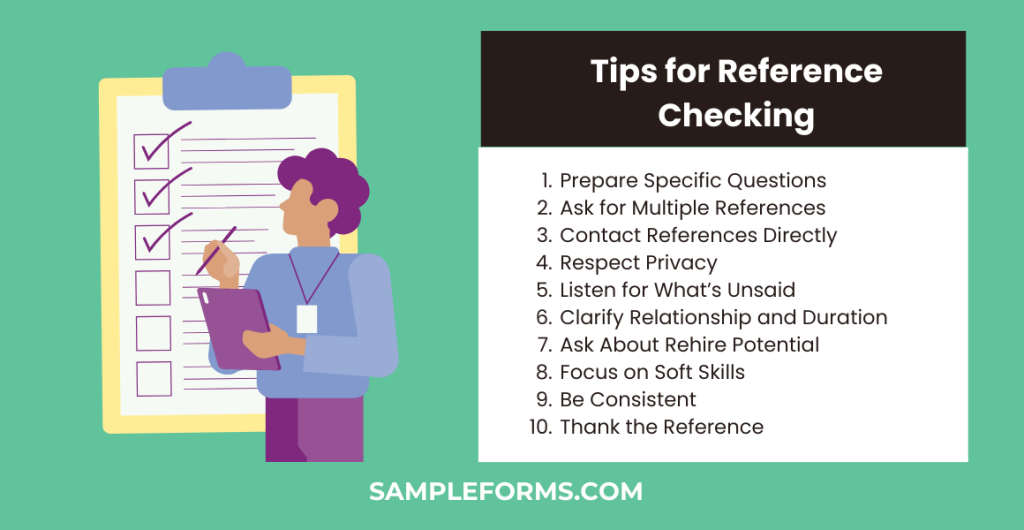Delving into the crucial stage of the hiring process, the Reference Check Form acts as a pivotal tool for employers. This comprehensive guide sheds light on conducting thorough reference checks, incorporating both Telephone Reference Check Form and Employment Reference Form, to ensure you’re making informed hiring decisions. From confirming past employment details to understanding the candidate’s work ethic, our guide, enriched with examples, streamlines the process, ensuring a smooth pathway to securing the best talent for your team.
Download Reference Check Form bundle
What is a Reference Check Form?
A Reference Check Form is a standardized document used by employers to verify a candidate’s employment history, skills, and character through conversations with provided references. It’s an essential step in the recruitment process, ensuring candidates possess the qualities they claim. The form typically includes sections for Reference Checks and Employment References, allowing for a detailed assessment of the candidate’s professional background and suitability for the position.
Reference Check Format
Reference Check Form PDF
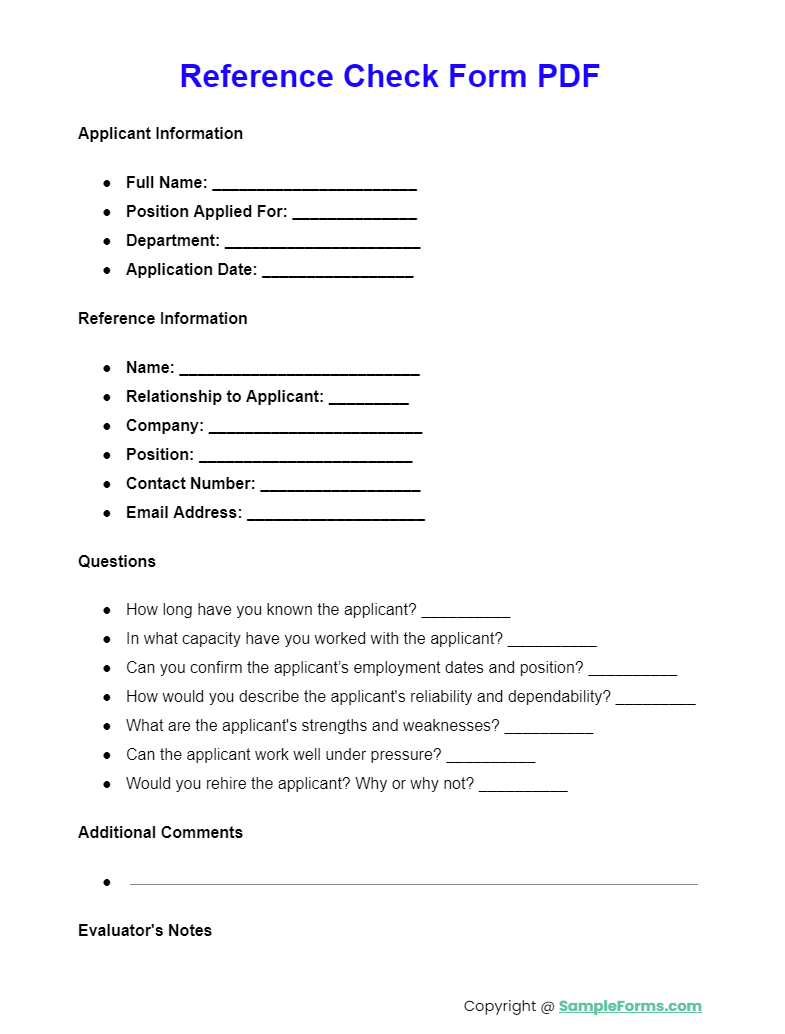
Download our Reference Check Form PDF for a comprehensive tool to assess potential hires, incorporating the Reference Questionnaire Form. This ensures a structured approach to gathering critical employment insights efficiently.
Employment Reference Check Form
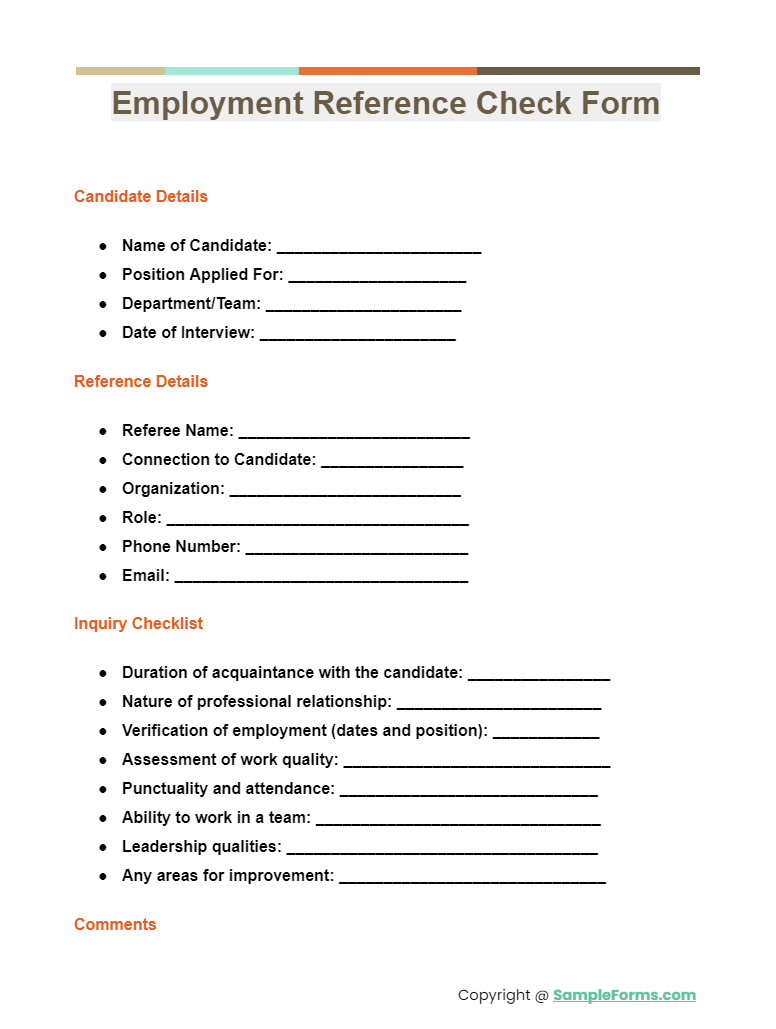
Our Employment Reference Check Form streamlines the verification process, including a section for the Reference Request Release Form. It’s designed to obtain detailed feedback on candidates’ past job performances and work ethics.
Reference Check Form Filled Sample
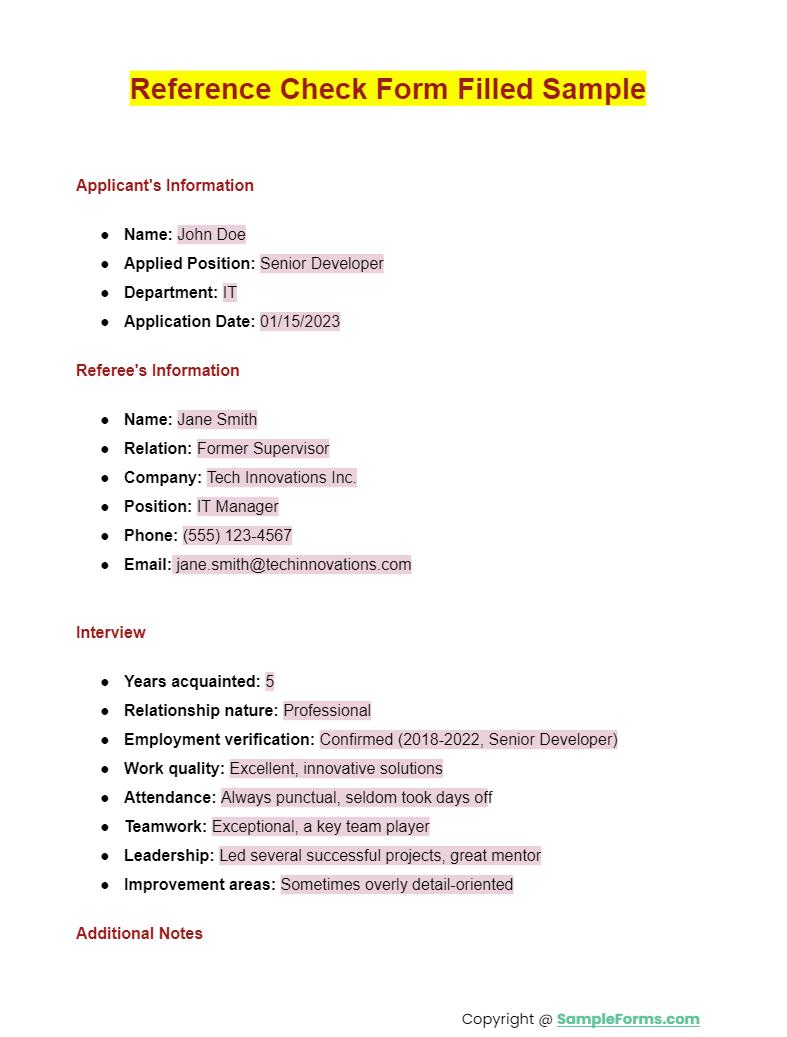
Explore a Reference Check Form Filled Sample to understand how to effectively complete checks. It features responses based on the Reference Check Phone Script Form, guiding users through conducting productive reference conversations.
Reference Check Form with Answers
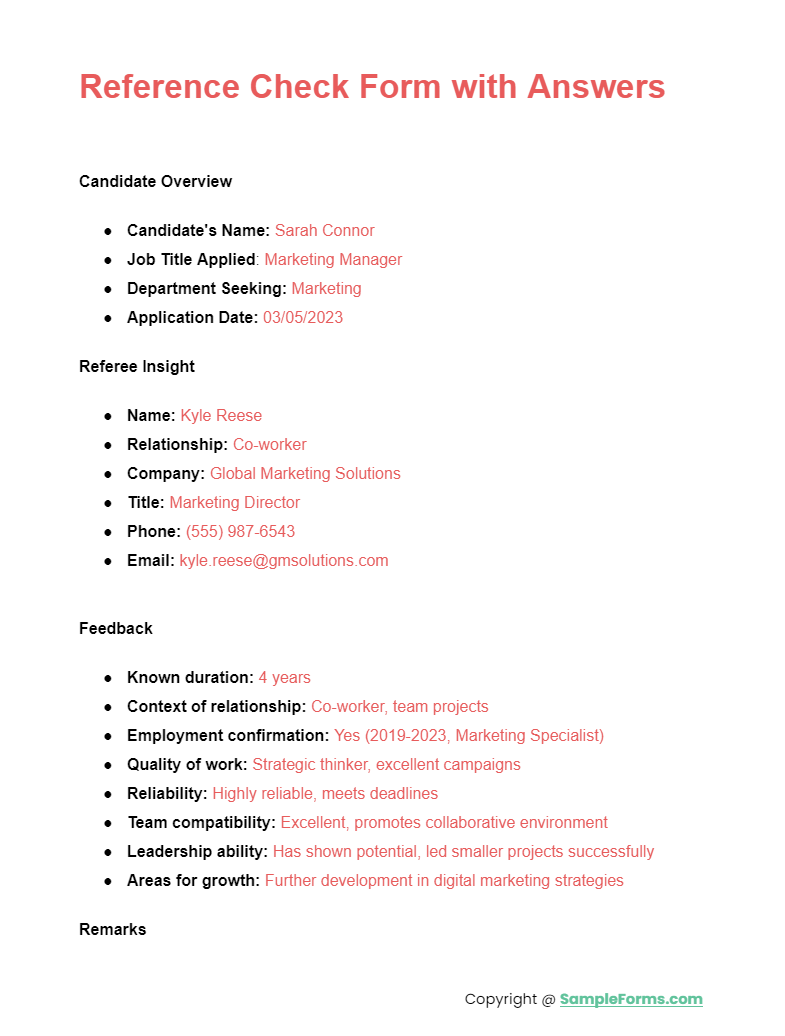
More Reference Check Form Samples
Applicant Reference Check Form
Candidate Selection Reference Check Form
College Position Reference Check Form
Dealer Reference Check Form
Employee Reference Check Form
Employment Reference Check Form
Job Competencies Reference Check Form
Professional Staff Reference Check Form
Reference Check Form Sample
Reference Checking Consent Authorization Form
Reference Check Questionnaire Form
Blank Reference Check Form
Staff Reference Checking Form
Telephone Reference Check Form
Volunteer Applicant Reference Check Form
Basic Reference Check Form
What’s Inside a Reference Check Form?
Checking references can be a tricky and time-consuming task for employers; however, it serves as a precautionary measure to avoid hiring individuals who will soon be the cause of burden in the workplace. With the following sections, employers will be able to conduct efficient and purposeful reference checks to any job position.
1. Applicant details
This primary section should cater the personal information of the applicant which includes his full name, the position that he is applying for, his contact numbers, as well as his professional title if he has any. The individual names of the referees will also be needed to be stated in this section along with the identity of the person who is conducting the reference check.
2. Employer Introduction
With this section, the employer or the reference checker will have a script for him to have a formal flow in conducting the applicant reference checking procedure. The introduction will inform the other party or the outside company about the general information that they must provide to the employer along with the length or approximate time that the reference check will take to complete. Other parts of the introduction that the employer may include can be the details of where the answers of the reference check are allotted to be used such as for the purpose of an applicant evaluation and employee assessment.
3. General Questions
This section is also known as a character reference questionnaire, which will mainly contain a number of questions about the applicant’s job history. The questions can range from the applicant’s ability to maintain a professional relationship with his colleagues, the capacity of the applicant to handle pressure in his job, as well as the specific dates of the applicant’s employment. The previous company’s performance evaluation for the applicant’s employment is also included as part of the questions to be asked by the employer to acquire a full distinction of the applicant from the other candidates for the job position.
4. Job-specific Questions
The relativity of the applicant’s skills and manners for the job that he is applying will be highlighted and determined in this section. The employer may gather questions for a survey from the job qualifications posted by the company. The other party who will be answering and who will rate the applicant’s appropriateness for the job position can include a few descriptions and situations wherein the applicant’s skills served a great use from his previous employment.
5. Closing Recommendations
The decision of whether the other party will consider to re-employ the applicant under their company and in the same job position will be indicated in this last section along with the list of reasons why. Additionally, comments and the contact information of the applicant’s previous company are also necessary for reaching out and inquiring about the employment status of the applicant whenever needed.
How do you Write a Reference Check?
Writing a reference check involves several structured steps to obtain useful information about a candidate:
- Prepare: Begin by reviewing the candidate’s application and resume to tailor your questions effectively. Ensure you have a Check Application Status Form to track the progress.
- Authorization: Obtain permission from the candidate using a Background Check Authorization Form to ensure legal compliance.
- Develop Questions: Craft specific questions related to the job role, including queries about strengths, weaknesses, and work ethic. Incorporate an Equipment Checkout Form for roles requiring equipment handling.
- Contact References: Use the Check Request Form to organize and document each reference contact attempt.
- Conduct Interview: Follow a structured interview guide, noting responses carefully for comparison and evaluation.
- Document Findings: Summarize the feedback for each reference on the Background Check Information Form for easy reference during the decision-making process.
What Should I Provide for Reference Check?
When providing information for a reference check, ensure you include:
- Candidate Consent: A completed Check Consent Form from the candidate authorizing the reference check.
- Reference Contact Details: Provide comprehensive contact information for each reference.
- Job Description: Share the role’s responsibilities and requirements to guide the reference’s feedback.
- Specific Questions: List specific questions or areas of interest, particularly if using a Business Credit Check Form for financial roles.
- Confidentiality Assurance: Reassure references their feedback will remain confidential, encouraging honesty.
How do you Fill Out a Reference Check form Answers?
Filling out a reference check form with answers involves:
- Listen Carefully: Note the reference’s comments accurately, avoiding any personal bias.
- Objective Responses: Fill in responses objectively, focusing on facts and specific examples provided.
- Clarify and Probe: For vague answers, use follow-up questions to clarify. This is particularly important when discussing soft skills or using a Paycheck Pickup Authorization Form to verify financial reliability.
- Summarize Key Points: At the end of each section, summarize the key takeaways to highlight patterns or concerns.
- Confidentiality: Maintain the confidentiality of the feedback, especially when handling sensitive information through a Check Authorization Form.
How do Employers do Reference Checks?
Employers conduct reference checks by:
- Planning: Identify which references to contact and prepare questions related to the job’s requirements.
- Getting Permission: Use a Tenant Background Check Form to get the candidate’s consent.
- Contacting References: Reach out to each reference, possibly scheduling a time to talk if necessary.
- Asking Targeted Questions: Inquire about the candidate’s performance, reliability, and fit for the role.
- Recording Responses: Document answers on a Background Information Form for thorough evaluation.
What do you say when a Reference asks about Weaknesses?
When asked about a candidate’s weaknesses, focus on providing constructive feedback:
- Be Honest but Supportive: Share observations on areas for improvement, linking them to specific instances or behaviors.
- Contextualize: Explain how the weakness was displayed and if it’s been addressed or improved over time.
- Balance: Always balance mentioning a weakness with a strength or how the candidate overcomes challenges.
What are the Red Flags on a Reference Check?
Red flags in a reference check include:
- Vagueness: Lack of specific examples or detailed feedback can indicate issues.
- Hesitation: Pauses or reluctance to answer certain questions might reveal underlying concerns.
- Consistency: Discrepancies between the candidate’s account and references’ feedback.
- Negative Feedback: Specific negative comments about professionalism, reliability, or interpersonal skills.
- Qualification Concerns: Doubts about the candidate’s qualifications or achievements, especially if verified through a Check Register Form.
Tips for Reference Checking
Although hiring managers have been taught on how to deal with the applicant selection process, it is always essential that a few keynotes and tips will be remembered for assuring success. Below are some of the tips that hiring managers must keep in mind as they will begin the reference check:
- Prepare Specific Questions: Tailor your questions to gain insights on the candidate’s skills, work ethic, and behaviors relevant to the position.
- Ask for Multiple References: Request a mix of professional contacts, including former managers, colleagues, and subordinates to get a comprehensive view.
- Contact References Directly: Ensure authenticity and clarity by speaking directly to the reference, avoiding intermediaries.
- Respect Privacy: Notify the candidate before contacting their references and ensure confidentiality throughout the process.
- Listen for What’s Unsaid: Pay attention to hesitations or vague responses as they can be as telling as direct answers.
- Clarify Relationship and Duration: Understand the context of the relationship between the candidate and the reference to better interpret feedback.
- Ask About Rehire Potential: Inquiring if a reference would rehire the candidate can reveal overall satisfaction and performance.
- Focus on Soft Skills: Beyond technical abilities, ask about the candidate’s teamwork, communication, and problem-solving skills.
- Be Consistent: Use a consistent set of questions for all references to fairly compare candidates.
- Thank the Reference: Show appreciation for their time and insights, fostering goodwill and possibly gaining additional information in closing. Also Check our Internal Review Form.
What is the Purpose of a Reference Check?
The purpose of a reference check is to verify information provided by candidates, using tools like the Reference Verification Form, and to gain insights into their work ethic, skills, and suitability for the role.
What do Employers ask in a Reference Check?
Employers typically inquire about the candidate’s responsibilities, performance, work ethic, and teamwork abilities, often formalized through a Background Check Information to ensure comprehensive evaluation.
What are the Red Flags on a Reference Check?
Red flags include vague feedback, reluctance to provide details, direct criticism, discrepancies in reported skills, and any mention of unprofessional behavior, often flagged during Background Verification Form completion.
How long do Reference Checks Take?
Reference checks can vary, typically taking a few days to a week, depending on the availability of referees and the thoroughness required by the Background Check Application Form process.
Do all Employers do Reference Checks?
Not all employers conduct reference checks, but many do as part of their hiring process to ensure candidate fit and integrity, often documented via a Background Information. Also Check our Social Security Verification Form.
Do Reference Checks Matter?
Yes, reference checks matter significantly. They validate candidate information, provide deeper insight into their work history and behavior, and can prevent hiring mistakes, supported by insights from the Income Verification Form.
Related Posts
-
FREE 25+ Life Insurance Beneficiary Forms Download – How to Create Guide, Tips
-
FREE 10+ Pay Increase Forms Download – How to Create Guide, Tips
-
FREE 20+ Individual Evaluation Forms Download – How to Create Guide, Tips
-
FREE 50+ Supervisor Evaluation Forms Download – How to Create Guide, Tips
-
FREE 40+ Employee Incident Report Forms in Download – How to Create Guide, Tips
-
FREE 45+ Work From Home Forms in PDF | MS Word
-
FREE 23+ Employee Leave Request Forms in PDF | MS Word | XLS
-
FREE 53+ Human Resources Forms in PDF | MS Word | Excel
-
Return to Work Form
-
FREE 6+ Recruitment Process Timeline Samples in PDF
-
FREE 7+ Recruitment Flow Chart Samples in PDF
-
FREE 5+ Recruiter Performance Review Forms in PDF | MS Word
-
FREE 7+ Payroll Adjustment Forms in MS Word | PDF | Excel
-
Two Weeks Notice Resignation Letter
-
Employee Absence Form
